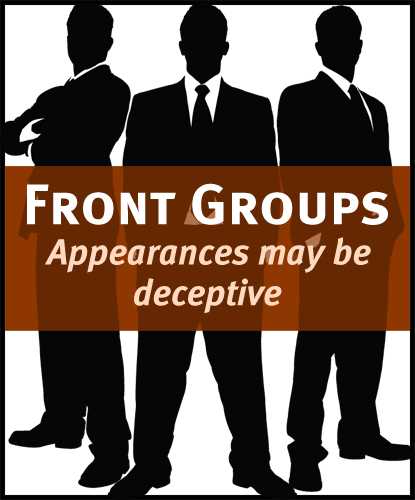Tapping into Consumer Assumptions
Submitted by Judith Siers-Poisson on
Rep. Al Wynn of Maryland and Rep. Hilda Solis of California have asked the Government Accountability Office to look into the bottled water industry.

Submitted by Judith Siers-Poisson on
Rep. Al Wynn of Maryland and Rep. Hilda Solis of California have asked the Government Accountability Office to look into the bottled water industry.
 A February 9 Los Angeles Times article about University of California, Los Angeles professor Edythe London taking a $6 million grant from Philip Morris to study the brains of child smokers and monkeys addicted to nicotine once again raises questions about the appropriateness of university researchers accepting tobacco industry funding. Philip Morris denied that they have a stake in this particular project, but the denial had little credibility since the company no doubt will benefit from understanding more about youth smoking and nicotine addiction. After all, the future of their business depends on these two topics. Still, we wonder why any person curious enough to be engaged in scientific research isn't also curious enough to find out what's in it for Philip Morris before they accept the funds? These days, the answer is as close as your computer.
A February 9 Los Angeles Times article about University of California, Los Angeles professor Edythe London taking a $6 million grant from Philip Morris to study the brains of child smokers and monkeys addicted to nicotine once again raises questions about the appropriateness of university researchers accepting tobacco industry funding. Philip Morris denied that they have a stake in this particular project, but the denial had little credibility since the company no doubt will benefit from understanding more about youth smoking and nicotine addiction. After all, the future of their business depends on these two topics. Still, we wonder why any person curious enough to be engaged in scientific research isn't also curious enough to find out what's in it for Philip Morris before they accept the funds? These days, the answer is as close as your computer.
Submitted by Sheldon Rampton on
 "Here's a recipe for academic controversy," observes Richard C. Paddock: "First, find dozens of hard-core teenage smokers as young as 14 and study their brains with high-tech scans. Second, feed vervet monkeys liquid nicotine and then kill at least six of them to examine their brains. Third, accept $6 million from tobacco giant Philip Morris to pay for it all.
"Here's a recipe for academic controversy," observes Richard C. Paddock: "First, find dozens of hard-core teenage smokers as young as 14 and study their brains with high-tech scans. Second, feed vervet monkeys liquid nicotine and then kill at least six of them to examine their brains. Third, accept $6 million from tobacco giant Philip Morris to pay for it all.
Submitted by Diane Farsetta on
 The U.S.
The U.S.
Submitted by Diane Farsetta on
 An increase in "green" marketing has led
An increase in "green" marketing has led
Submitted by Judith Siers-Poisson on
The case of Pierre Meneton is fueling demands for legal protections for whistleblowers in France. Meneton is a researcher for the National Institute of Health and the National Institute of Health and Medical Research. He is going to court on January 31, 2008, to face charges of defamation. Several industrial salt producers are suing Meneton for a comment he made during an interview in March 2006. "The lobbying of salt producers and agribusiness is very active.
Submitted by Judith Siers-Poisson on
 Linda KeenThe fifty-year old nuclear reactor at Chalk River in Ontario, Canada, is running again after the Canadian Parliament overruled the president of the Canadian Nuclear Safety Commission.
Linda KeenThe fifty-year old nuclear reactor at Chalk River in Ontario, Canada, is running again after the Canadian Parliament overruled the president of the Canadian Nuclear Safety Commission.
Submitted by Conor Kenny on
Last week, House Republicans once again defeated an attempt override Bush's veto of the State Children’s Health Insurance Program (SCHIP) expansion bill. Democratic leaders had re-submitted their old bill but actually lost ground this time as three Democrats and two Republicans failed to show up for the vote.
Submitted by Anne Landman on
 With marketing constraints increasing and cigarette usage declining in the developed world, Philip Morris (PM) is increasingly targeting smokers in other countries. PM now makes sweet-smelling cigarettes with cloves and other flavors that have twice the tar and nicotine as conventional products, created to appeal to smokers in developing countries.
With marketing constraints increasing and cigarette usage declining in the developed world, Philip Morris (PM) is increasingly targeting smokers in other countries. PM now makes sweet-smelling cigarettes with cloves and other flavors that have twice the tar and nicotine as conventional products, created to appeal to smokers in developing countries.
"The American public deserves to know when someone is trying to persuade them." — U.S. Federal Communications Commissioner Jonathan Adelstein, Thursday, January 17, 2008
 Today, the Center for Media and Democracy and our partners at Consumer Reports WebWatch launched an exciting new project: Full Frontal Scrutiny. The site seeks to shine a light on front groups -- organizations that state a particular agenda, while hiding or obscuring their identity, membership or sponsorship, or all three. Google the term "front groups" and the number one return is CMD's extensive articles on its SourceWatch site.
Today, the Center for Media and Democracy and our partners at Consumer Reports WebWatch launched an exciting new project: Full Frontal Scrutiny. The site seeks to shine a light on front groups -- organizations that state a particular agenda, while hiding or obscuring their identity, membership or sponsorship, or all three. Google the term "front groups" and the number one return is CMD's extensive articles on its SourceWatch site.
Center for Media and Democracy (CMD)
520 University Ave, Ste 305 • Madison, WI 53703 • (608) 260-9713
CMD is a 501(c)(3) tax-exempt non-profit.
© 1993-2024